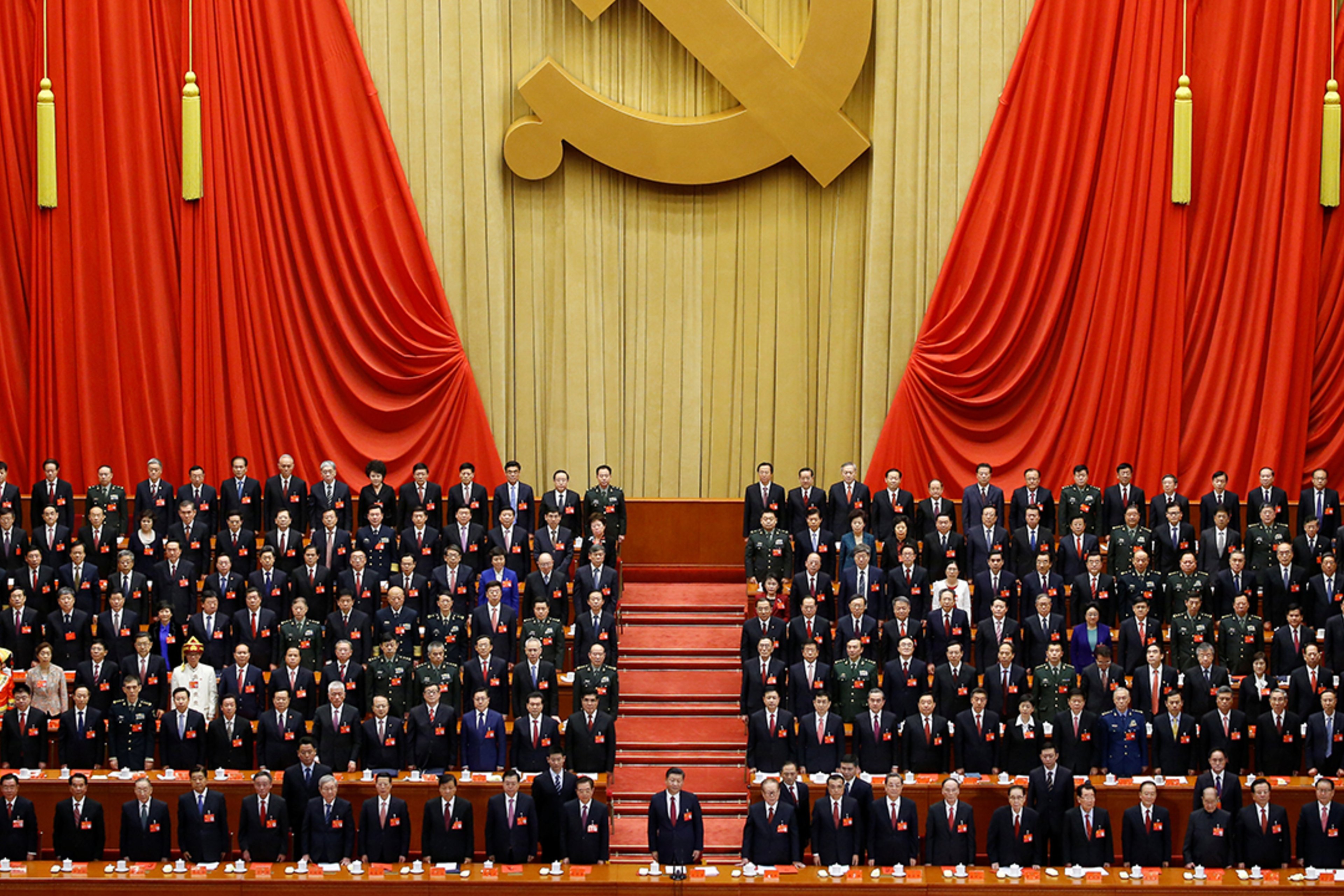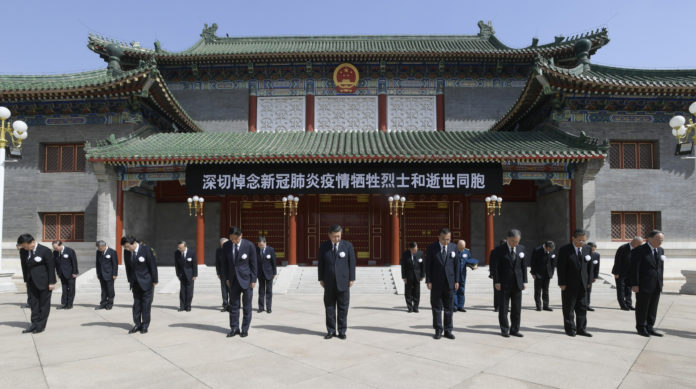Human spirits never die. Most recently on April 4 2020 the Chinese government observed national day of mourning which was a vivid reflection of its holistic policies towards economics of humanity. Economics of humanity has multiplier effects which pay back its unlimited dividends for centuries to come.
It also upheld the philosophy of Confucius which emphasized correlation between dynamics and dynasty and government’s moral values/ strength, optimal rightness of social relationships, justice, kindness, and sincerity. It was held to honor its doctors, paramedics and citizens who died in the fight against the coronavirus and the patients who died of the same. A salute was arranged honoring the more than 3,300 people were killed by the deadly COVID-19 since it was discovered in December 2019. There have been more than 1.1 million confirmed cases of the virus worldwide; more than 60,000 have so far died.
China’s national mourning reflected various holistic human traits of its society and governance. Human traits have direct correlation with pure economic development. Human traits are pro-development attributions.
Honesty, determination, industriousness, service, submission and forwardness are the keys to a stable society and sustainable economic development in the world and China is not an exception. China is the apex of human values and always cares about sacrifices of its people. China respects the departed souls who laid down their precious lives for any national cause. It is because of this that COVID-19 pandemic has been diminished.
Throughout China, people of all classes, ranks, affiliations, professions and association observed three minutes of national mourning. They stopped what they were doing and everything was standstill. In big cities to rural areas, ethnic groups and people belonging to different classes together bowed their heads and paid respect to the thousands of neighbors and fellow Chinese national, friends, family, patients and medical workers who are no longer with them in the fight against COVID-19. There was pin drop silence as air raid sirens and vehicle horns wailed their lament and showed their solidarity and submission towards the sacrifices of Chinese people against COVID-19.

President Xi Jinping led the national mourning at a ceremony in Beijing, dressed in black and surrounded by the most prominent members of the Chinese Communist Party such as Li Keqiang, Li Zhanshu, Wang Yang, Wang Huning, Zhao Leji, Han Zheng, and Wang Qishan, everyone standing in silence for three minutes in the Zhongnanhai leadership compound. Flags flew at half-mast and all entertainment was suspended throughout the country as people paid a silent tribute in front of the national flag, a white flower in their chests stood in stark contrast with their black suits.
The National Mourning Day of on April 4, 2020 was the first time that a major public health emergency had triggered nationwide mourning. Since the implementation of the National Flag Law, China has held three national mournings to honor victims of the 2008 Wenchuan earthquake, the 2010 Yushu earthquake, and the 2010 Gansu mudslide

Moreover, fourteen people who died fighting the COVID-19 in central China’s Hubei Province were honored as martyrs, the highest honorary title which the Communist Party of China (CPC) and the country awards to citizens who bravely sacrificed their lives for the nation and the people.
It was a Chinese national response to all international propaganda tactics, widespread conspiracy theories and dirty politics. Even Chinese mass media (public-private) Xinhua and China Daily changed the palettes of their home pages to black and white and showed their solidarity with people of China in their sorrow. Social media was also active to honor the departed souls and did the same with their profiles. Online, celebrities like “X-Men: Days of Future Past” star Fan Bingbing swapped their glamorous social media profile pictures for somber photos in grey or black. Chinese gaming and social media giant Tencent suspended all online games on the this day. The People’s Republic has recorded more than 80,000 cases and 3,000 deaths since the outbreak began in December 2019. The majority of cases were in Wuhan, Hubei province, where the SARS-like virus was first detected in December 2019. The Chinese government hailed it as a heroic city for the hardships and sacrifices of its 11 million citizens.
According to Chinese and international media in Wuhan, the capital of Hubei province and the epicenter of the outbreak, all traffic lights in urban areas turned red at 10 a.m. and all road traffic ceased for three minutes. About 75 percent of the people who are confirmed dead from the virus in China were in Wuhan, a city of 11 million people in Central China that is still under quarantine, which is expected to be lifted in the next week.
Since then, the virus has spread to all corners of the globe and has now become a global health threat sickening more than a million, killing over 60,000 people and paralyzing the world economy. The overall number of confirmed cases reported in the United States now exceeds China’s official tally by threefold.
To manage the human crisis of COVID-19, local authorities in Wuhan city and Hubei province did not waste any time in locking down cities. The Chinese leadership also saved time that democracies usually need in building bipartisan or multi-party consensus on potentially consequential decisions. Due to systematic public awareness program the Chinese people did not react to quarantine and lockdown restrictions with resistance or panic. They stayed in their homes and put masks whenever going outside. There was no panic among the general public in buying items of daily use like masks, paper towels or water like we saw in recent weeks in the US or other affected countries. On March 25, China lifted the lockdown in Hubei with the exception of Wuhan and opened transport services. From April 8, outbound traffic from Wuhan will be available.
Conclusion
Confucius, the greatest Chinese philosopher and political thinker spoke highly about humans and human values. He cared about human beings and the human condition of metaphysics. He was more worried about humans than not gods. He worried about life, not death which remained main crux of his teachings. He emphasized that good government would promote social harmony and the general well-being.
Many countries around the globe paid their homage to Chinese national mourning day and showing spirits of respect, humanity and togetherness in their statements and noble acts. The Republic of Azerbaijan displayed great respect by placing the Chinese flag on its towers of fire and other important national buildings on April 4, 2020.
Proper channelization of grief and optimal utilization of sorrow will be a value addition to Chinese social harmony and revival of national economy in the days to come. Economics of humanity remained vector against all villain vanguards during the evolution of human civilization in the past and it will be same even in our existence beyond Mars in the future.




